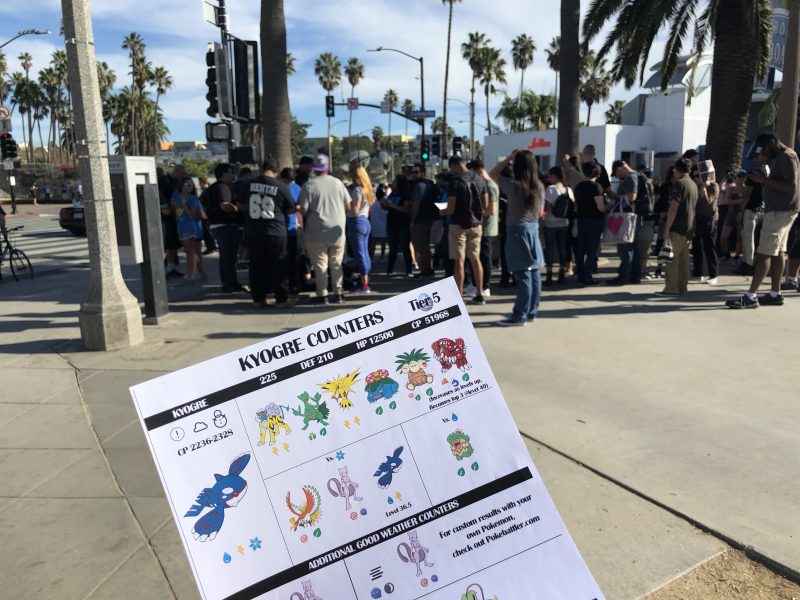- Niantic, the developer of “Pokémon Go” and the forthcoming “Harry Potter: Wizards Unite,” announced that it’s raised $245 million in a deal valuing it at “almost $4 billion.”
- CEO John Hanke tells us that Niantic is cash-flow positive, but the money helps it bunker down for a possible venture capital crunch as it starts the years-long road towards a possible IPO.
- The funding round brings in Samsung and Axiomatic Games as strategic investors – two companies that Hanke says are very important for helping Niantic realize its dream of bringing tech closer into the real world.
- Meanwhile, Niantic is also investing in the Real World Platform, which will see it license big pieces of its tech to other developers. Hanke says that Niantic can be both a gaming studio and a developer tools company.
- “Pokémon Go,” still Niantic’s flagship game, has generated more than $2 billion in revenue since launch, says Hanke, and will see a further investment in real-world events for players.
Niantic, the developer of “Pokémon Go” and the forthcoming “Harry Potter: Wizards Unite,” says that it’s now valued at “almost $4 billion,” following a $245 million funding round led by IVP, with participation from strategic investors Samsung and Axiomatic Gaming.
John Hanke, the CEO of Niantic, tells Business Insider that the company didn’t need the money, strictly speaking: “Pokémon Go,” revitalized by a plethora of fan-requested features, has brought in over $2 billion of revenues since its 2016 launch, says Hanke. Furthermore, he says, Niantic is cash-flow positive – which is different from profitable – and still has lots of cash in the bank from previous investment rounds.
Still, Hanke says, the time was right, as he foresees a crunch coming, where it’ll be harder for companies like Niantic to raise investment capital amid a possible economic downturn. He’s not necessarily against Niantic getting acquired, he says, and indeed, Niantic itself spun out of Google. Still, it’s hard to guess how much control a would-be buyer would exert, and staying independent is the best way to ensure that Niantic gets to do what it wants to do.
So while Niantic doesn't plan to IPO for "many more years," the cash helps make sure the company can weather any storms between now and then as an independent company.
"The best way to invent the future is to be around to build it," Hanke said.
Why these investors?

Beyond the money, Hanke says that those strategic investors were a big reason why Niantic chose to go after new funding, serving to "cement relationships that were already in place." Now that these companies have a financial stake in Niantic, the lines of communication are much more open, and the company can benefit from their expertise.
Samsung, Hanke notes, is an expert at Android phones, and has made big investments in augmented reality - the technology for overlaying digital imagery over the real world, largely introduced to the mainstream by "Pokémon Go" itself. Otherwise, Hanke says that he sees promise in using Samsung's investments in smart sensors to bring augmented reality closer to the real world, as physical objects can have presences in the real world.
Axiomatic, for its part, is an entertainment and sports management firm with a controlling stake in Team Liquid, a well-known esports organization, as well as an investment in "Fortnite" maker Epic Games. Co-chaired by Peter Guber, Bruce Karsh, Ted Leonsis, and Jeff Vinik - all of whom own one or more professional, major league sports teams - Hanke believes Axiomatic can bring a lot of expertise about how to engage fans and throw live events.
Combined, Hanke says, these partners can help Niantic come up with ways to make real-world gaming events "much more fun." He notes that Niantic has been encouraged by the success of Community Day, a series of events thrown by the company to encourage "Pokémon Go" players to hit the streets en masse, and that the company is prioritizing figuring out ways to do more big events, indoors and outdoors - which dovetails with the company's goal of using tech to get people on their feet and exploring the world around them.
Read more: The CEO behind 'Pokémon Go' explains why it's become such a phenomenon
"We will attempt to expand and continue to invest in events," Hanke says.
Here comes Harry Potter
The next big game launch for Niantic is "Harry Potter: Wizards Unite," developed in conjunction with Portkey Games, a subsidiary of Warner Bros. Interactive Entertainment. All we know is that it's expected to launch this year, and Hanke was tight-lipped about sharing any details.
He says that there's a simple reason why the stewards of "Pokémon" and "Harry Potter," two of the most valuable franchises on the planet, have chosen to go with Niantic: Nobody else puts the same level of polish or care into a smartphone game, let alone one that involves exploring the real world, and the extra effort pays off in fan engagement, he says.
When the likes of The Pokémon Company or Warner Bros. come to Niantic, they're saying "let's do it big, let's do it right, let's invest in it," says Hanke. "There's no comparable companies."
Otherwise, Hanke hints that Niantic has more games coming, even as it invests further in its existing lineup, including "Pokémon Go" and "Ingress Prime."
The cloud connection
The other facet of Niantic's business is the Real World Platform, which the company teased in the middle of last year.
Essentially, the Real World Platform will enable software developers to take advantage of the technology Niantic created for its own games. Developers will be able to use Niantic's augmented reality tech, as well as the company's secret sauce for multiplayer gaming and for connecting gameplay to real-world locations.
"You put so much tech into those games, it makes sense to leverage it," says Hanke.

However, Hanke also sees it as having a variety of other uses, which nobody has yet foreseen. That could be in business software, or consumer software, or even robotics - but not necessarily in gaming, entirely. The company has announced a $1 million contest for early developers on the Real World Platform.
He says that while the Real World Platform is a major focus for Niantic going forward, he thinks that it can be both a gaming studio and a developer tools company.
"We really want to be both," says Hanke.
As he points out, Epic Games is both the developer of mega-phenomenon "Fortnite," and the proprietor of the popular Unreal Engine software for game developers.

Pokémon, go on
For Hanke, 2018 was a pivotal year for "Pokémon Go," which he says has finally become the game Niantic envisioned all along.
In the last year, Niantic has introduced long-awaited features to "Pokémon Go," including Pokémon battling and trading with friends. In November, too, Nintendo launched "Pokémon: Let's Go" for the Nintendo Switch, which offers an integration with "Pokémon Go."
All of this has led to Pokémon Go seeing a resurgence in popularity. But it took a great deal of effort within the company.
Niantic spent the months after its rocky 2016 launch "on our heels," trying to patch the game up on the fly.
He says that 2017 was characterized by taking a step back, making new hires, and building a plan. But 2018 was when the team achieved a "regular pace of updates," which he says will carry into 2019. Player engagement, for instance, was way up in 2018 from 2017. And that's giving Hanke optimism for the new year.
As it continues this goodwill tour with fans, Hanke says that Niantic keeps up with the "Pokémon Go" community via Reddit. While Hanke says that Niantic tries not to let fan feedback drive its overall product strategy, he says that it's very useful in fine-tuning an idea once it's out. When Pokémon trading and battling came out, Hanke says, fans highlighted all kinds of little problems that Niantic had missed in-house, guiding it to solutions.
Finally, Hanke says that Nintendo and the Pokémon Company - the Nintendo joint venture that owns the trademark - have been very pleased with both "Pokémon Go" and "Pokémon: Let's Go," and are looking for more "synergies" between the game and the core franchise. That's good news for Niantic, too, Hanke says.
"We've benefitted in a lot of ways," says Hanke.

